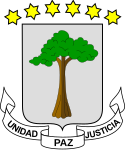 |
|---|
A constitutional referendum was held in Equatorial Guinea on 16 November 1991. The new constitution would replace the one-party state with multi-party politics. It was approved by 98.4% of voters with a 94.3% turnout. [1]
 |
|---|
A constitutional referendum was held in Equatorial Guinea on 16 November 1991. The new constitution would replace the one-party state with multi-party politics. It was approved by 98.4% of voters with a 94.3% turnout. [1]
| Choice | Votes | % |
|---|---|---|
| For | 98.4 | |
| Against | 1.6 | |
| Invalid/blank votes | - | |
| Total | 100 | |
| Source: African Elections Database | ||

Equatorial Guinea, officially the Republic of Equatorial Guinea, is a country on the west coast of Central Africa, with an area of 28,000 square kilometres (11,000 sq mi). Formerly the colony of Spanish Guinea, its post-independence name evokes its location near both the Equator and the Gulf of Guinea. As of 2021, the country had a population of 1,468,777.

The politics of Equatorial Guinea take place in a framework of a presidential republic, whereby the President is both the head of state and head of government. Executive power is exercised by the government. Legislative power is vested in both the government and the Chamber of People's Representatives

Teodoro Obiang Nguema Mbasogo is an Equatoguinean politician and former military officer who has served as the second president of Equatorial Guinea since August 1979. He is the longest-serving president of any country ever and the second-longest consecutively-serving current non-royal national leader in the world.

The Democratic Party of Equatorial Guinea is the ruling political party in Equatorial Guinea. It was established by President Teodoro Obiang Nguema Mbasogo on 11 October 1987.

Convergence for Social Democracy is the opposition party in Equatorial Guinea. It was the only opposition party with parliamentary representation during 2013-2017.

Equatorial Guinea elects on the national level a head of state – the president – and a legislature. The president is elected for a seven-year term by the people. President Teodoro Obiang Nguema Mbasogo was re-elected unopposed on 15 December 2002. The Chamber of People's Representatives has 100 members, elected for a five-year term by proportional representation in multi-member constituencies.

The Chamber of Deputies is the lower house of the Parliament of Equatorial Guinea.

Early legislative elections were held in Equatorial Guinea on 4 May 2008, alongside local elections; 100 seats in parliament and 230 council seats were up for election. The ruling Democratic Party of Equatorial Guinea won 89 seats in parliament.

Presidential elections were held in Equatorial Guinea on November 29, 2009. Teodoro Obiang Nguema, who has been President since 1979, ran for another term and won re-election with 95.8% of the vote, according to official results. Opposition leader Plácido Micó Abogo placed second with 3.6%. However, international observers and the main opposition candidate questioned the legitimacy of this election, noting the poor management which created an unfriendly field for other candidates to take part, media manipulation and the unbalanced results.

General elections were held in Spanish Guinea on 22 September 1968 to elect a President and National Assembly that would lead the country when it gained independence as Equatorial Guinea later that year. A second round of the presidential election was held on 29 September.

Parliamentary elections were held in Equatorial Guinea on 3 and 10 July 1988. The Democratic Party of Equatorial Guinea (PDGE), established the previous year, was the sole legal party at the time, as an attempt at legalising the opposition Progress Party of Equatorial Guinea in June had failed. The PDGE presented a single list of 60 candidates for the 60 seats, which was reportedly approved by 99.2% of voters.

Parliamentary elections were held in Equatorial Guinea on 21 November 1993. They were the first multi-party elections in the country since the pre-independence elections of 1968. Although seven parties were allowed to run in the election, the ruling Democratic Party of Equatorial Guinea (PDGE) maintained its grip on power, winning 68 of the 80 seats in the enlarged Chamber of People's Representatives. According to official figures, voter turnout was 67%. The Joint Opposition Platform, an alliance of eight opposition parties, called for a boycott and claimed voter turnout was as low as 20%.

Legislative elections were held in Equatorial Guinea on 26 May 2013, alongside local elections. Following constitutional reforms approved in a 2011 referendum, they were the first elections in which the newly established Senate is elected. The ruling Democratic Party of Equatorial Guinea won all but one seat in both houses of Parliament.
The Popular Union of Equatorial Guinea is a political party in the Equatorial Guinea. It is led by Daniel Martinez Ayecaba. The party was originally banned by the ruling Democratic Party of Equatorial Guinea, the ruling party since 1987, but was legalized in May 1992.

Presidential elections were held in Equatorial Guinea on 24 April 2016. In a vote initially scheduled for November but brought forward by seven months, incumbent President Teodoro Obiang Nguema Mbasogo retained his office with 93.7 percent of the vote.

The United National Workers' Party was a political party in Equatorial Guinea. It was the only political party in the country from 1970 to 1979, during the dictatorship of Francisco Macías Nguema.

General elections were held in Equatorial Guinea on 20 November 2022 to elect the President and members of Parliament, alongside local elections. Originally the parliamentary elections had been scheduled for November 2022 and presidential elections for 2023. However, in September 2022 Parliament approved a proposal to merge the elections due to economic constraints.